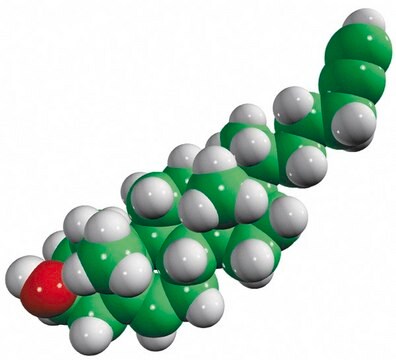Wichtige Dokumente
901844
Allyl-poly(ethylene glycol)-b-poly(ε-caprolactone)
PEG average Mn 5,000, PCL average Mn 5,000
Synonym(e):
PEG-b-PCL, PEG-PCL, allyl PEG-PCL diblock copolymer, allyl-PEG-PCL
About This Item
Empfohlene Produkte
Form
powder or solid
Mol-Gew.
PCL average Mn 5,000
PEG average Mn 5,000
Farbe
white to off-white
PDI
≤1.3 (by GPC)
Lagertemp.
−20°C
Anwendung
Lagerklassenschlüssel
13 - Non Combustible Solids
WGK
WGK 3
Hier finden Sie alle aktuellen Versionen:
Analysenzertifikate (COA)
Die passende Version wird nicht angezeigt?
Wenn Sie eine bestimmte Version benötigen, können Sie anhand der Lot- oder Chargennummer nach einem spezifischen Zertifikat suchen.
Besitzen Sie dieses Produkt bereits?
In der Dokumentenbibliothek finden Sie die Dokumentation zu den Produkten, die Sie kürzlich erworben haben.
Kunden haben sich ebenfalls angesehen
Artikel
Professor Nicola Tirelli (Istituto Italiano di Tecnologia, Italy) highlights the microfluidic-assisted method for fabricating well-defined and reproducible nanoparticles for drug delivery research.
Professor Nicola Tirelli (Istituto Italiano di Tecnologia, Italy) highlights the microfluidic-assisted method for fabricating well-defined and reproducible nanoparticles for drug delivery research.
Professor Robert K. Prud’homme introduces flash nanoprecipitation (FNP) for nanoparticle fabrication, which is a scalable, rapid mixing process for nanoparticle formulations.
Professor Nicola Tirelli (Istituto Italiano di Tecnologia, Italy) highlights the microfluidic-assisted method for fabricating well-defined and reproducible nanoparticles for drug delivery research.
Unser Team von Wissenschaftlern verfügt über Erfahrung in allen Forschungsbereichen einschließlich Life Science, Materialwissenschaften, chemischer Synthese, Chromatographie, Analytik und vielen mehr..
Setzen Sie sich mit dem technischen Dienst in Verbindung.
